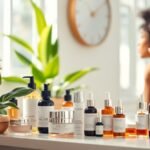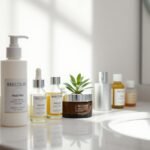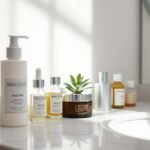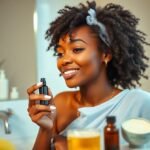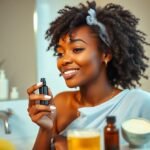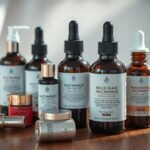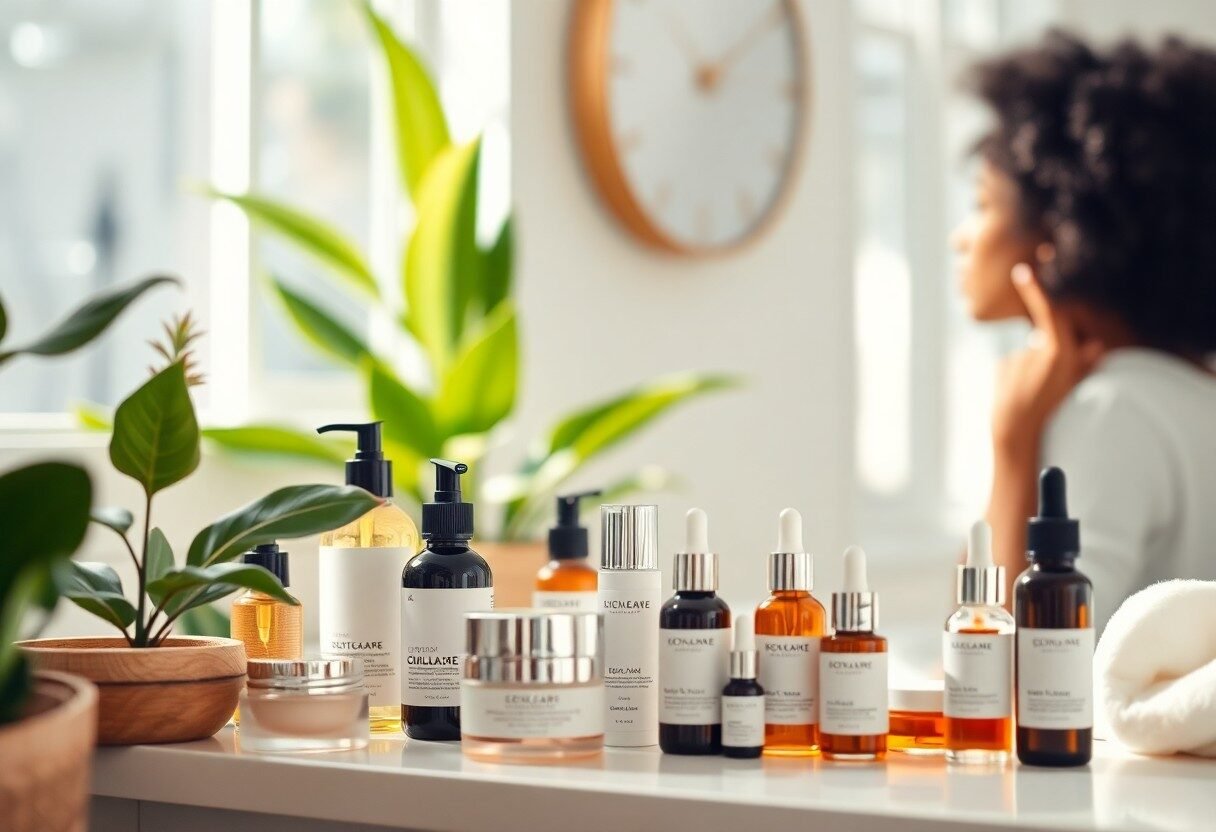
Black women have unique skincare needs that require a thoughtful approach to layering skincare products for optimal results. I want to share my insights on how to effectively use serums, moisturizers, and oils in your routine, ensuring that each product enhances the natural beauty of your skin. By learning about the right order and combinations, you can address specific concerns such as hyperpigmentation or dryness, paving the way for a radiant complexion. Join me on this journey to discover how layering can unlock your skin’s full potential.
Key Takeaways:
- Begin with a gentle cleanser to remove impurities without stripping moisture from the skin.
- Incorporate a hydrating toner to restore pH balance and enhance absorption of subsequent products.
- Utilize serums that cater to specific skin concerns, such as hyperpigmentation or dryness, for targeted treatment.
- Apply moisturizers that provide hydration and lock in moisture, focusing on rich ingredients like shea butter or hyaluronic acid.
- Include sunscreen as the final step in the morning routine to protect against UV damage and skin aging.
- Understand the importance of layering products from thinnest to thickest consistency to maximize efficacy.
- Tailor your skincare routine to individual skin types and concerns, considering unique needs related to melanin-rich skin.
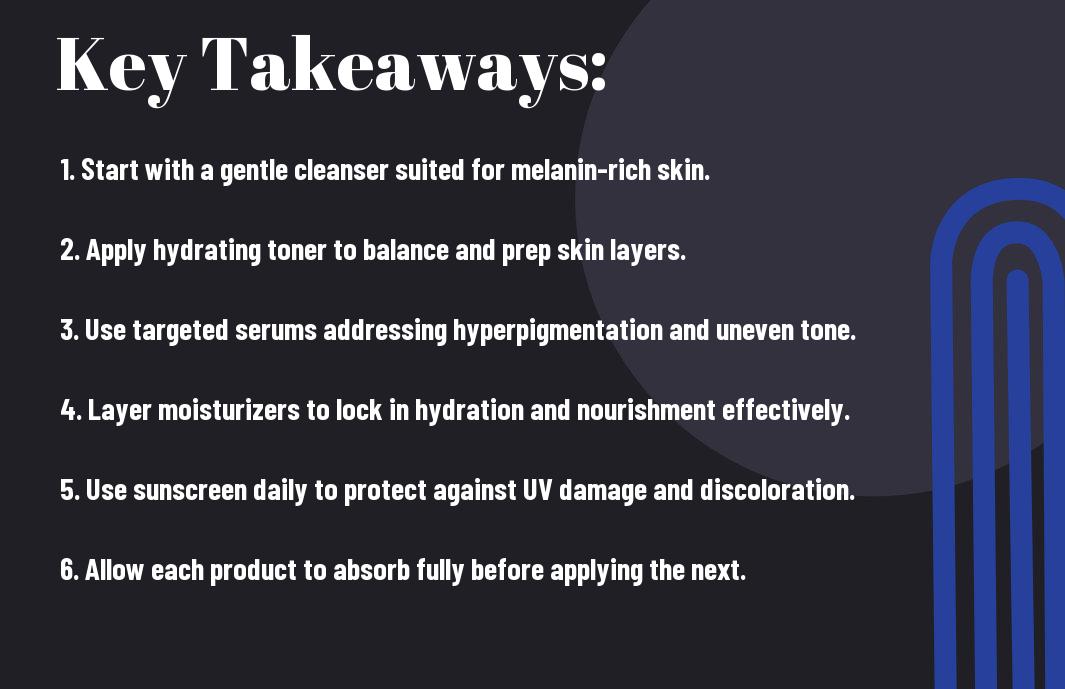
Decoding the Unique Needs of Black Skin
Understanding the specific requirements of Black skin is vital for effective skincare. Your skin is often more prone to certain issues due to its unique composition and varying melanin levels. Embracing the beauty of your skin also means recognizing how to nourish and protect it properly, allowing your natural glow to shine.
The Role of Melanin in Skincare
Melanin not only gives your skin its beautiful hue, but it also provides some protection against UV rays. Higher melanin levels can reduce the risk of sunburn, yet they don’t eliminate the necessity for sunscreen. Incorporating broad-spectrum SPF into your routine is still vital to prevent hyperpigmentation and maintain an even skin tone.
Common Skin Concerns Among Black Women
Black women often face unique skincare challenges, including hyperpigmentation, acne scarring, and dryness. These issues can stem from a variety of factors, including hormonal changes, environmental influences, and genetic predisposition. Understanding these skin concerns enables you to tailor an effective skincare routine that addresses your specific needs.
Hyperpigmentation, in particular, affects many of us, often resulting from inflammation or acne. That pesky dark spot can linger long after the blemish has disappeared. It’s vital to incorporate effective ingredients like Vitamin C and Niacinamide to help fade these spots over time. Additionally, dryness is common due to the structure of Black skin, so opting for rich, hydrating products like oils and creams is key to locking in moisture and maintaining a healthy complexion.
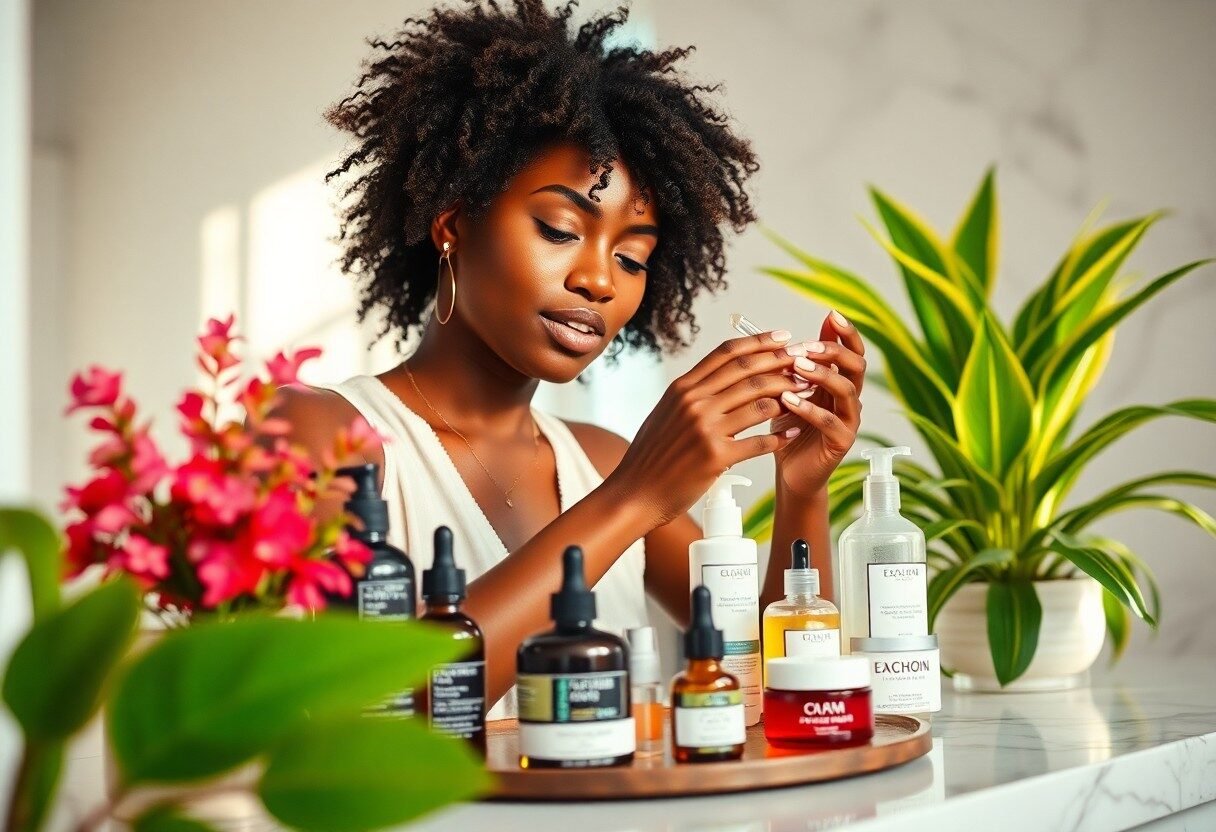
The Layering Method: Order Matters
Proper layering of skincare products enhances their effectiveness and ensures your skin receives the most benefits. Starting with lighter formulations and progressing to thicker, heavier products allows your skin to absorb each treatment effectively. For example, begin with a gentle cleanser, follow with a toner, then apply serums, and finally finish with a moisturizer or oil. This sequence not only maximizes absorption but also prevents obstruction of necessary ingredients that can occur if products are applied in the wrong order.
The Science of Product Absorption
Product absorption largely depends on the molecular size and composition of the ingredients. Smaller molecules penetrate deeper into the skin, while larger ones remain on the surface. Using products with active ingredients like hyaluronic acid can significantly enhance moisture retention and overall skin health. I focus on layering based on the texture and formulation to optimize absorption and ensure that my skin is reaping the maximum benefits from each product.
Essential Product Types for an Effective Routine
Creating an effective skincare routine for black women involves a few necessary product types tailored to address specific concerns, such as hyperpigmentation, hydration, and overall skin health. Key products include a hydrating cleanser, exfoliating toner, serums with targeted actives (like Vitamin C or Niacinamide), a nourishing moisturizer, and sunscreen. Each of these products serves a unique purpose to cater to the needs of diverse skin types and concerns, creating a holistic approach to skincare.
| Hydrating Cleansers | Remove dirt without stripping moisture |
| Exfoliating Toners | Gently sloughs off dead skin cells |
| Moisturizers | Locks in hydration to keep skin supple |
| Serums | Target specific skin concerns like acne or dullness |
| Sunscreen | Protects against UV damage and dark spots |
Incorporating each of these products ensures that you’re addressing multiple facets of skin health. Start with a hydrating cleanser that prepares your skin, and then the exfoliating toner refines texture by removing dead cells. Serums act as powerhouse solutions tailored to your unique needs, while a good moisturizer seals in all the goodness. Lastly, sunscreen protects your skin from UV damage; without it, all your efforts can be in vain. Assume that establishing a solid foundation using these necessarys will significantly enhance your skincare routine.
- Hydrating Cleansers: necessary for moisture maintenance.
- Exfoliating Toners: crucial for cell turnover.
- Moisturizers: vital for skin barrier protection.
- Serums: focused treatment for skin issues.
- Sunscreen: obligatory for everyday protection.
| Step 1 | Cleansing |
| Step 2 | Toning |
| Step 3 | Serums |
| Step 4 | Moisturizing |
| Step 5 | Sunscreen |
With this structured approach, your skin is not only primed for hydration, but you also maximize the potential of each product. Assume that by implementing this method, you can effectively combat hyperpigmentation and embrace radiant skin that adapts and thrives.
Choosing Ingredients: What Works Best
Ingredients play a significant role in the effectiveness of your skincare routine. Focusing on natural and active components can provide exceptional results for Black women. Look for products containing healing botanicals, vitamins, and mineral-rich extracts that cater to your skin’s unique needs. Ingredients like shea butter and jojoba oil offer deep moisture, while vitamin C and niacinamide promote an even skin tone and luminosity.
Antioxidants and Hydration for Radiant Skin
Incorporating antioxidants like vitamin E and ferulic acid into your routine can significantly combat oxidative stress and promote a healthier skin barrier. I lean on potent hydrating agents such as hyaluronic acid and glycerin, which can hold over 1,000 times their weight in water, ensuring my skin remains plump and youthful. Together, these elements foster a radiant glow and maintain a vibrant complexion.
Targeted Treatments for Hyperpigmentation and Texture
For addressing concerns such as hyperpigmentation and uneven skin texture, I turn to specialized treatments containing ingredients like azelaic acid, glycolic acid, and licorice root extract. These not only brighten the skin but also promote cell turnover, helping to resurface and even out complexion. Regular application can lead to a noticeable reduction in dark spots and smoother skin texture over time.
Focusing on targeted treatments becomes crucial when tackling hyperpigmentation and uneven texture. For instance, azelaic acid is excellent for calming inflammation while reducing the appearance of dark spots, making it suitable for sensitive skin. Meanwhile, glycolic acid helps exfoliate dead skin cells, promoting renewal and softness. Since your skin may react uniquely to various ingredients, consider patch-testing new products and combining them judiciously to find the right balance that works for you.
Timing Your Skincare Ritual: Day vs. Night
Integrating the right products into your morning and evening routines is vital for achieving healthy skin. Daytime rituals focus on strengthening your skin barrier against daily aggressors, while nighttime rituals emphasize recovery and regeneration. Understanding the unique goals for each time of day allows you to strategically use specific products to maximize their benefits.
Daytime Defense: Protecting Against Environmental Stressors
Your daytime skincare routine needs to be armed with protection, especially against environmental stressors like UV rays and pollution. Incorporating a broad-spectrum sunscreen is non-negotiable, as it shields your skin from potential damage. Additionally, antioxidants like vitamin C can neutralize free radicals encountered throughout the day, keeping your complexion vibrant and resilient.
Nighttime Recovery: Repairing and Nourishing While You Sleep
Nighttime rituals serve a different purpose, allowing your skin to focus on repair and nourishment. As you sleep, your skin goes into recovery mode, working to heal any damage sustained throughout the day. Products that contain ingredients like retinol or hyaluronic acid become particularly powerful during this time, promoting cell turnover and deeper hydration.
During this restorative period, applying a richer moisturizer can significantly enhance your skin’s hydration levels, aiding in the replenishment of moisture lost during the day. Additionally, treatments like serums rich in peptides can stimulate collagen production, effectively reducing fine lines and promoting elasticity. The night is the perfect time to indulge in targeted treatments that address specific skin concerns, allowing those powerful ingredients to penetrate deeply without interference from external factors. Prioritizing this rejuvenation process helps keep your skin looking vibrant, plump, and healthy come morning.
Dismissing Myths and Embracing Individuality
Understanding your unique skin is a journey, especially when dismissing the misconceptions surrounding skincare. Many outdated beliefs suggest that all Black women experience similar skin issues, yet our diversity means there’s no one-size-fits-all approach. Embracing your unique skin type and needs allows you to create a routine that truly works for you, fostering confidence and enhanced beauty.
Common Misunderstandings About Skincare for Black Women
One prevalent misunderstanding is that Black skin doesn’t need sunscreen due to its natural melanin protection. In reality, damage from UV rays still impacts all skin types, and using a broad-spectrum SPF is important. Additionally, some believe that hyperpigmentation is an unavoidable part of aging, but with proper care, it can be managed effectively.
Tailoring Your Routine to Personal Skin Needs
A personalized approach to skincare is vital for Black women, as factors such as genetics, climate, and lifestyle play significant roles in skin health. Start by identifying your skin type—whether oily, dry, or combination—and customize your products accordingly. You might find that incorporating ingredients like niacinamide for oil control or hyaluronic acid for hydration yields the best results for your specific concerns.
In tailoring your routine, assess how your skin responds to various products. For instance, if dark spots concern you, incorporating serums containing vitamin C and alpha arbutin can be beneficial. Meanwhile, make sure to introduce ingredients gradually to avoid overloading your skin, and observe how your skin feels after each application. By being attentive to your skin’s reactions and adjusting your regimen accordingly, you cultivate a routine that serves your individual needs, leading to healthier, glowing skin over time.
Final Words
Conclusively, mastering the art of layering skincare products allows you to reap the maximum benefits tailored to your unique skin needs. I encourage you to start by understanding your skin type and its specific concerns, and then methodically apply your products from the thinnest to the thickest consistency. By doing so, you can enhance hydration, nourishment, and overall skin health. Your skin deserves the best, so take the time to experiment and discover a routine that truly elevates your natural beauty.
FAQ: The Art of Layering Skincare Products for Maximum Benefits in Black Women
Q: Why is layering skincare products important for Black women?
A: Layering skincare products is crucial for Black women as it helps address specific skin concerns, such as hyperpigmentation, dryness, and uneven texture. Black skin is often prone to these issues, and a well-structured routine ensures that each product penetrates effectively, delivering the necessary nutrients and hydration for a healthier complexion.
Q: What is the correct order for layering skincare products?
A: The general order for layering skincare products should be: cleanser, toner, serum, moisturizer, and sunscreen (for daytime). It’s important to start with the lightest products and move to the heaviest to maximize absorption. This method allows each layer to effectively deliver its benefits without being obstructed by denser products.
Q: Which types of products should be prioritized in a skincare routine for Black women?
A: Key products to prioritize include hydrating serums with hyaluronic acid, brightening agents such as vitamin C, and moisturizers rich in emollients like shea butter or oils. Additionally, using broad-spectrum sunscreen daily is vital to protect against skin damage, as Black skin can also be susceptible to UV rays.
Q: How can I determine which products work well together when layering?
A: To find compatible products, consider the key ingredients and their functions. Products with lighter textures, like gels or essences, generally pair well with richer creams. Additionally, avoid layering active ingredients that may irritate, like retinols and acids, unless you are certain your skin can tolerate them. It’s best to introduce new products gradually and observe how your skin reacts.
Q: Are there specific ingredients that Black women should look for in their skincare products?
A: Yes, Black women should look for hydrating ingredients like glycerin and squalane, antioxidants such as vitamin C and E for brightening, and calming components like niacinamide to soothe the skin. Also, products containing exfoliating acids like glycolic acid can help even out skin tone and texture, which is often a concern.
Q: How often should I exfoliate, and what is the best way to incorporate it into my routine?
A: Exfoliation should be done 1-3 times a week, depending on your skin’s sensitivity and type. Incorporate it after cleansing and before applying serums. Choose gentle chemical exfoliants over physical scrubs to reduce the risk of irritation. Following exfoliation with a hydrating serum and moisturizer will help replenish the skin’s moisture barrier.
Q: What should I do if I experience irritation or breakouts after layering products?
A: If you experience irritation or breakouts, it’s advisable to temporarily revert to a simpler routine. Stop using new products and observe if the issue resolves. Patch testing new products on a small area of skin before full application can help prevent adverse reactions. If problems persist, consulting a dermatologist can provide personalized recommendations and solutions.
